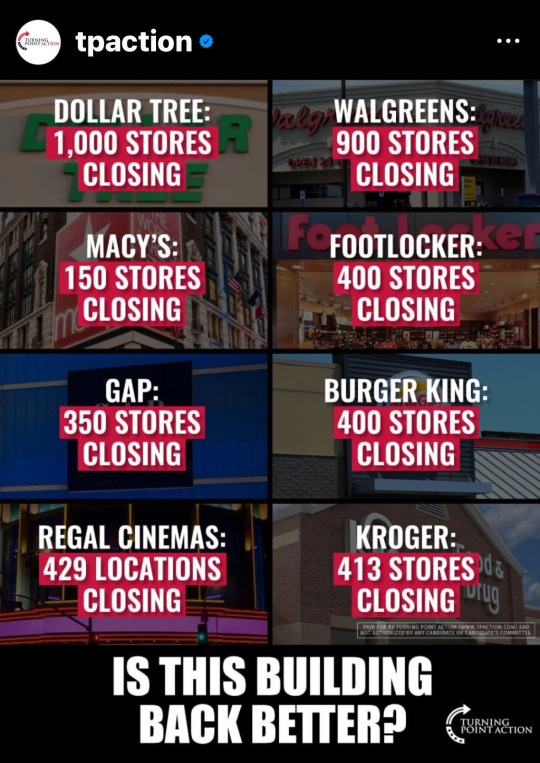#build back better
Text
WEF Caught Paying Arsonists To 'Burn Down the World' as Part of Sick Depopulation Plan
Far-left arsonists are engaged in a globalist plot to “burn down the world” according to a WEF insider who warns that humanity has been primed to fall for the globalist elite’s three-card trick.
The global elite laid the groundwork with the Covid pandemic, training the masses to be compliant, while pre-programming them with years of climate change propaganda in the media. As far as they are concerned, the wildfires are the final nail in our coffin.
Climate change is not only a hoax, it is a decades-old global depopulation plot, and WEF-infiltrated governments all over the world are going along with it. 🤔
#pay attention#educate yourselves#educate yourself#knowledge is power#reeducate yourself#reeducate yourselves#think for yourselves#think about it#think for yourself#do your homework#do some research#do your own research#ask yourself questions#question everything#build back better#government corruption
374 notes
·
View notes
Text

94 notes
·
View notes
Text
Elizabeth Warren on weaponized budget models

In yesterday’s essay, I broke down the new series from The American Prospect on the hidden ideology and power of budget models, these being complex statistical systems for weighing legislative proposals to determine if they are “economically sound.” The assumptions baked into these models are intensely political, and, like all dirty political actors, the model-makers claim they are “empirical” while their adversaries are “doing politics”:
https://pluralistic.net/2023/04/03/all-models-are-wrong/#some-are-useful
If you’d like an essay-formatted version of this post to read or share, here’s a link to it on pluralistic.net, my surveillance-free, ad-free, tracker-free blog:
https://pluralistic.net/2023/04/04/cbo-says-no/#wealth-tax
Today edition of the Prospect continues the series with an essay by Elizabeth Warren, describing how her proposal for universal child care was defeated by the incoherent, deeply political assumptions of the Congressional Budget Office’s model, blocking an important and popular policy simply because “computer says no”:
https://prospect.org/economy/2023-04-04-policymakers-fight-losing-battle-models/
When the Build Back Better bill was first mooted, it included a promise of universal, federally funded childcare. This was excised from the final language of the bill (renamed the Bipartisan Infrastructure Bill), because the CBO said it would cost too much: $381.5b over ten years.
This is a completely nonsensical number, and the way that CBO arrived at it is illuminating, throwing the ideology of CBO modeling into stark relief. You see, the price tag for universal childcare did not include the benefits of childcare!
As Warren points out, this is not how investment works. No business leader assesses their capital expenditures without thinking of the dividends from those investments. No firm decides whether to open a new store by estimating the rent and salaries and ignoring the sales it will generate. Any business that operates on that basis would never invest in anything.
Universal childcare produces enormous dividends. Kids who have access to high-quality childcare grow up to do better in school, have less trouble with the law, and earn more as adults. Mothers who can’t afford childcare, meanwhile, absent themselves from the workforce during their prime earning years. Those mothers are less likely to advance professionally, have lower lifetime earnings, and a higher likelihood of retiring without adequate savings.
What’s more, universal childcare is the only way to guarantee a living wage to childcare workers, who are disproportionately likely to rely on public assistance, including SNAP (AKA food stamps) to make ends meet. These stressors affect childcare workers’ job performance, and also generate public expenditures to keep those workers fed and housed.
But the CBO model does not include any of those benefits. As Warren says, in a CBO assessment, giving every kid in America decent early childhood care and every childcare worker a living wage produces the same upside as putting $381.5 in a wheelbarrow and setting it on fire.
This is by design. Congress has decreed that CBO assessments can’t factor in secondary or indirect benefits from public expenditure. This is bonkers. Public investment is all secondary and indirect benefits — from highways to broadband, from parks to training programs, from education to Medicare. Excluding indirect benefits from assessments of public investments is a literal, obvious, unavoidable recipe for ending the most productive and beneficial forms of public spending.
It means that — for example — a CBO score for Meals on Wheels for seniors is not permitted to factor in the Medicare savings from seniors who can age in their homes with dignity, rather than being warehoused at tremendous public expense in nursing homes.
It means that the salaries of additional IRS enforcers can only be counted as an expense — Congress isn’t allowed to budget for the taxes that those enforcers will recover.
And, of course, it’s why we can’t have Medicare For All. Private health insurers treat care as an expense, with no upside. Denying you care and making you sicker isn’t a bug as far as the health insurance industry is concerned — it’s a feature. You bear the expense of the sickness, after all, and they realize the savings from denying you care.
But public health programs can factor in those health benefits and weigh them against health costs — in theory, at least. However, if the budgeting process refuses to factor in “indirect” benefits — like the fact that treating your chronic illness lets you continue to take care of your kids and frees your spouse from having to quit their job to look after you — then public health care costings become indistinguishable from the private sector’s for-profit death panels.
Child care is an absolute bargain. The US ranks 33d out of 37 rich countries in terms of public child care spending, and in so doing, it kneecaps innumerable mothers’ economic prospects. The upside of providing care is enormous, far outweighing the costs — so the CBO just doesn’t weigh them.
Warren is clear that there’s no way to make public child care compatible with CBO scoring. Even when she whittled away at her bill, excluding millions of families who would have benefited from the program, the CBO still flunked it.
The current budget-scoring system was designed for people who want to “shrink government until it fits in a bathtub, and then drown it.” It is designed so that we can’t have nice things. It is designed so that the computer always says no.
Warren calls for revisions to the CBO model, to factor in those indirect benefits that are central to public spending. She also calls for greater diversity in CBO oversight, currently managed by a board of 20 economists and only two non-economists — and the majority of the economists got their PhDs from the same program and all hew to the same orthodoxy.
For all its pretense of objectivity, modeling is a subjective, interpretive discipline. If all your modelers are steeped in a single school, they will incinerate the uncertainty and caveats that should be integrated into every modeler’s conclusions, the humility that comes from working with irreducible uncertainty.
Finally, Warren reminds us that there are values that are worthy of consideration, beyond a dollars-and-cents assessment. Even though programs like child care pay for themselves, that’s not the only reason to favor them — to demand them. Child care creates “an America in which everyone has opportunities — and ‘everyone’ includes mamas.” Child care is “an investment in care workers, treating them with respect for the hard work they do.”
The CBO’s assassination of universal child care is exceptional only because it was a public knifing. As David Dayen and Rakeen Mabud wrote in their piece yesterday, nearly all of the CBO’s dirty work is done in the dark, before a policy is floated to the public:
https://prospect.org/economy/2023-04-03-hidden-in-plain-sight/
The entire constellation of political possibility has been blotted out by the CBO, so that when we gaze up at the sky, we can only see a few sickly stars — weak economic nudges like pricing pollution, and not the glittering possibilities of banning it. We see the faint hope of “bending the cost-curve” on health care, and not the fierce light of simply providing care.
We can do politics. We have done it before. Every park and every highway, our libraries and our schools, our ports and our public universities — these were created by people no smarter than us. They didn’t rely on a lost art to do their work. We know how they did it. We know what’s stopping us from doing it again. And we know what to do about it.
Have you ever wanted to say thank you for these posts? Here’s how you can: I’m kickstarting the audiobook for my next novel, a post-cyberpunk anti-finance finance thriller about Silicon Valley scams called Red Team Blues. Amazon’s Audible refuses to carry my audiobooks because they’re DRM free, but crowdfunding makes them possible.
[Image ID: A disembodied hand, floating in space. It holds a Univac mainframe computer. The computer is shooting some kind of glowing red rays that are zapping three US Capitol Buildings, suspended on hovering platforms. In the background, the word NO is emblazoned in a retrocomputing magnetic ink font, limned in red.]
#empirical facewash#wealth tax#elizabeth warren#cbo#congressional budget office#penn wharton budget model#budgeting#economics#economism#computer says no#pluralistic#universal childcare#build back better#bipartisan infrastructure bill
252 notes
·
View notes
Text
At the end of this article, a homeowner is quoted as saying that there is "no good solution" to the problem of homelessness. He is speaking in the context of a false choice - let homeless people camp in urban areas or force them to move.
There is a solution to homelessness - affordable housing. And it would be cheaper to build or convert existing structures for that purpose than it is to continue to persecute the most vulnerable people in America.
Affordable housing would make it possible for people who are experiencing homelessness to focus on solving the problems that caused them to become homeless. They would be able to get jobs - many homeless people have jobs, but homelessness makes it much harder.
There are agencies in every city that would help people access mental health services and/or address other factors that make it harder for them to succeed, such as substance abuse. Housing would make it easier for people to take advantage of those services.
There will always be people who can't become self-sufficient. Many of those people can contribute to their communities, if they are given some help.
The relative few who simply can't or won't contribute are still human beings and worthy of housing. If they had a place to go, they would cause fewer problems for others. And again, it would be cheaper in the long run to house them.
This would take funding, of course. In the 1950s, when America's economy was the best it has ever been, the top tax rate was 90%. We wouldn't have to raise taxes on billionaires nearly that much to pay for nation-wide affrodable housing. Of course, government jobs, as under the New Deal, would make it possible for many people to work for the betterment of their communities and themselves.
Build back better than it ever was. Vote blue.
#build back better#new deal#vote blue#green new deal#vote democrat#vote biden#vote blue to save democracy#end citizens united#democracy#social democracy#tax the rich#vote blue 2024#tax the 1%#tax the wealthy#tax the billionaires#billionaires should not exist#democratic socialism#democrats now socialism later#homelessness#housing is a human right#vote biden/harris#biden/harris 2024
25 notes
·
View notes
Photo

#bank run#build back better#bt news#congress#bank bailouts#student debt#student loans#student loan crisis#cancel student loans#cancel student debt#student debt forgiveness#student debt relief#paid family leave#infrastructure#universal childcare#instagram
105 notes
·
View notes
Text

7 notes
·
View notes
Text
Silicon Valley Bank Bailout
youtube
SVB's Risk Management 🙄🙄🙄

#biden collapse#build back better#banking crisis#fraud#Biden's broken brain#margin call#alphabet hire#risk management#bailout
38 notes
·
View notes
Text

Build back better is working like a charm
5 notes
·
View notes
Video
youtube
Will Sen. Bernie Sanders Miss Kyrsten Sinema? “Not At All”
2 notes
·
View notes
Text

Reposted from @atttactical Outside a federal building supporting a "No Parking Anytime" sign.
#suppressor#rifle#rifles#guyswhoshoot#girlsthatshoot#silencer#guns#girlswhoshoot#pistols#girlswithguns#build back better
7 notes
·
View notes
Text


2 notes
·
View notes
Text

2 notes
·
View notes
